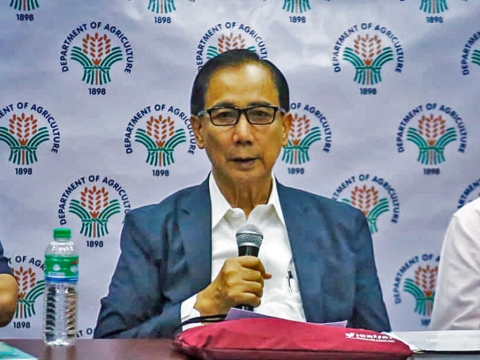An economist-lawmaker is pushing for an additional P12 billion funds for the Department of Agriculture (DA) for 2022, saying that its expansion is critical to economic recovery.
Albay Rep. Joey Salceda on Monday boosted DA Secretary William Dar’s request for an additional budget, citing the significance of the expanded programs in making the price of key commodities such as meat and vegetables “stable.”
“Inflation is the next big enemy after we have defeated the prospect of a stagnant recovery. We need lower prices for meat and vegetables, and feeds and fertilizers will play an important role,” Salceda said.
“As I said in a speech in February this year, when it comes to livestock prices, it’s all about feeds, feeds, feeds. And the DA is proposing increased spending on the corn development program.
After supply issues in meat due to the African swine fever and considering the reduced cost-competitiveness of our domestic meat industry, we need a strong feed sector,” he added.
Salceda, who also serves as chairperson of the House Committee on Ways and Means, said the cost component of feed per kilo of swine meat is P64, which he said is at least P4 higher than the competitors.
“The cost of animal feed as a share of total production costs is around 60 percent. That makes cheap corn very important to lowering meat inflation, the fastest-growing component of general prices this year,” he noted.
“That is why I support Secretary Dar’s call for an expanded national corn program. We need to prepare the country’s corn supply for what will inevitably be a sudden spike in demand as the country’s hog production ramps up next year,” he added.
The solon also pointed out that fertilizers need to be further subsidized.
“DA’s request for a fertilizer subsidy is well-founded on current circumstances, especially as fertilizer has gotten more expensive every year. Fertilizer Price Index has skyrocketed this year, going from 82.96 points at the start of the year to 204.51 points as of November,” he said.
“That adds to the pressure on vegetable prices, as well as the price of rice and corn, both of which are very heavy users of fertilizer. If we don’t provide fertilizer subsidies, we could see drastic upward pushes in cost of corn and rice, as well as derivative or allied sectors such as livestock,” he added.
He underscored that aside from the rising prices of fertilizers, increased fuel costs added to the burden of farmers, which would affect consumers in the end.
“We really need to help struggling farmers. The costs they have had to bear this year are among the highest ever. If we don’t help them, prices go up for everyone,” he said.
(Original article was posted by Michelle R. Guillang at Daily Tribune)

